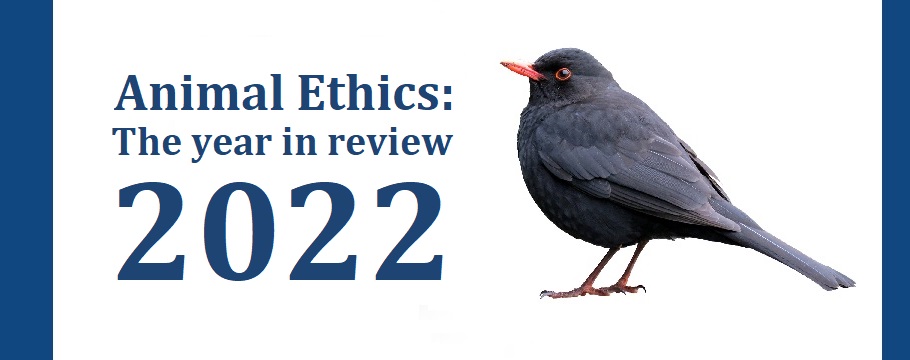Animal Ethics in 2022: The year in review

After the constraints we had in previous years due to the COVID pandemic, 2022 was a very active year for Animal Ethics. We also made two important strategic decisions about our work for the coming years:
Shifting toward doing more outreach and capacity building work. Work on wild animal suffering has increased substantially in recent years. When we first started to work, we were the only animal organization involved in this cause area. Due to this, we invested a lot of work into both research and outreach. Now the situation is different, with an increasing amount of research on the situation of wild animals and how to help them being published every year. As a result of this, in 2022 we shifted toward doing more outreach and capacity building work, although we continued to publish research on issues that are still under-addressed. This is important, since at this point we are the only organization working to spread concern about wild animal suffering for a wide audience.
Working more actively on longtermism and animals. Animal Ethics has always given serious consideration not only to present sentient beings, but also those who will exist in the future. We’ve already published materials about it (see for instance our piece about the importance of the future for animal advocacy and our video about wild animal suffering and the long term future). But in 2022 we started to do more active outreach work about this, including several events on the topic.
In addition to this, we have continued to work on under-addressed areas, such as raising concern about speciesism itself rather than just its practical consequences. We have also continued to expand our international work. Below is a description of our activities in 2022.
Talks and other events around the world
2022 was a very busy year for our spokespersons. They gave talks at many conferences internationally, as well as seminars at universities and academic conferences all around the world. The events where we spoke include the following:
Wild animal suffering. We gave talks and workshops about wild animal advocacy at the Animal and Vegan Advocacy Summit, the Animal Advocacy Conference Asia, the EAG conferences in London and in San Francisco, the Scholars for Society workshop, and the EAGx conference in Prague.
Our members also gave presentations about wild animal suffering at the Nordic Environmental Ethics Winter Symposium at the University of Copenhagen, at the Animals in Wars and Disasters symposium, and at the Principles of Ethical Decision Making in Environmental Practice workshop at the University of Freiburg. We also gave a seminar for graduate students in natural sciences at Imperial College London.
Animals and longtermism. Our spokespersons also gave talks about longtermism and animals at the EAGx Virtual and the EAGx conference in Singapore, and seminars about longtermism and animal advocacy at the Institute of Animal Law of Asia and the Pompeu Fabra University.
Speciesism. We gave online talks about speciesism and animal advocacy for the World Day for the End of Speciesism and International Animal Rights Day. We also gave talks on this topic for EA groups in Paris, Dresden, and Utrecht.
In addition to these events in English, we also gave talks about speciesism in Latin America, at universities in Mexico, Colombia, Costa Rica, and Argentina. We gave a keynote speech at the Chilean Animal Law Colloquia. We gave officially recognized university courses in Brazil and Argentina. In Colombia, an Animal Ethics representative gave a seminar to senators and members of the House at the Colombian National Congress.
Publications
At the beginning of the year, we produced a guide to effective advocacy that provides crucial advice for people who care about wild animal suffering but aren’t sure what to do about it.
Strategic considerations for effective advocacy to reduce wild animal suffering
Animal Ethics co-founder Oscar Horta published an original book for a wide audience on the moral consideration of animals, speciesism, and what to do to help animals, which we think is going to be influential in the field.
Making a stand for animals, a new book by Oscar Horta
We also published two reports on more specific issues highly relevant for the design of programs helping wild animals. One of them is a specific case study:
The other is about a method to learn more about wild animals in order to inform actions to help them:
Using thermal imaging to help animals in the wild: New literature review
In addition, we published new pages on topics relevant to animals (especially, though not only wild animals), including:
What technologies can be used to help wild animals?
International online work
One of the features that characterizes Animal Ethics work is that it is international. During 2022, we expanded our international reach. We added more content to our website in different languages; in total it has more than 1800 pages and posts now in all languages. This year we published our website in another language, Romanian. Our website is now available in 10 languages, including English, Chinese, Hindi, Spanish, French, Italian, Portuguese, Polish, and German.
We have also continued to publish YouTube videos, targeting especially young people and university students. In total, at this point we have more than 150 videos in several languages, including English, Spanish, and Portuguese.
Animal Ethics has been able to do all these things with a tight budget thanks to our large team of skilled volunteers. Despite this, to be able to work we are rely on the support of people who want a better world for all sentient beings. All we do would not be possible if it weren’t for the help of people like you. You can support our work and make a difference for all sentient beings, including those who live in the wild and those who will live in the future.